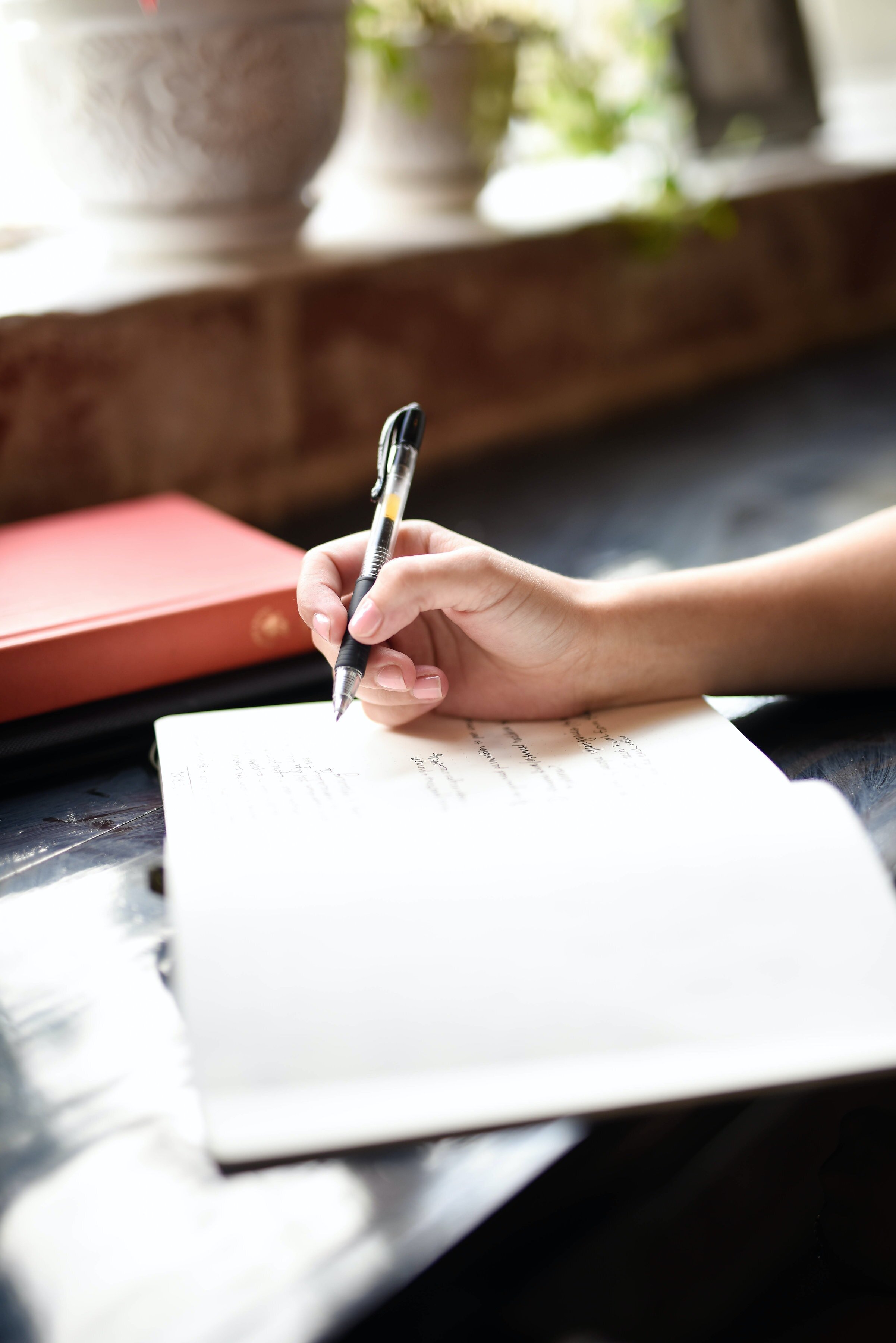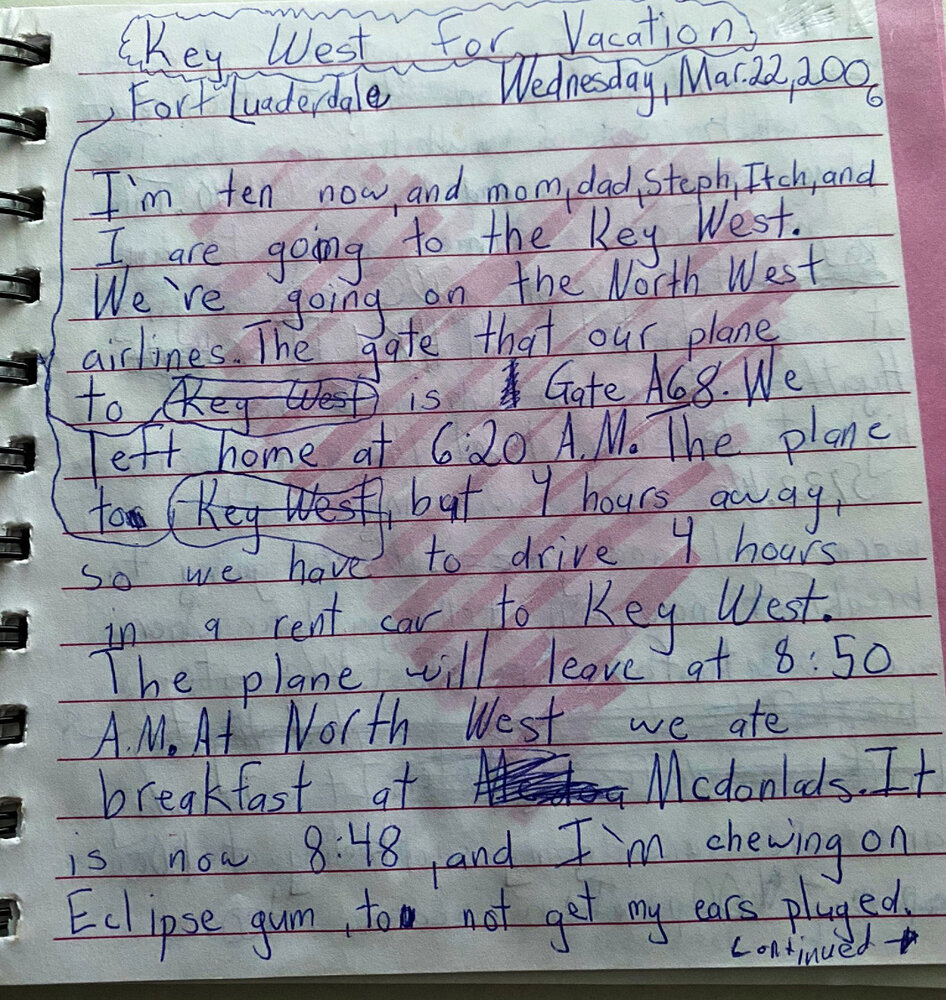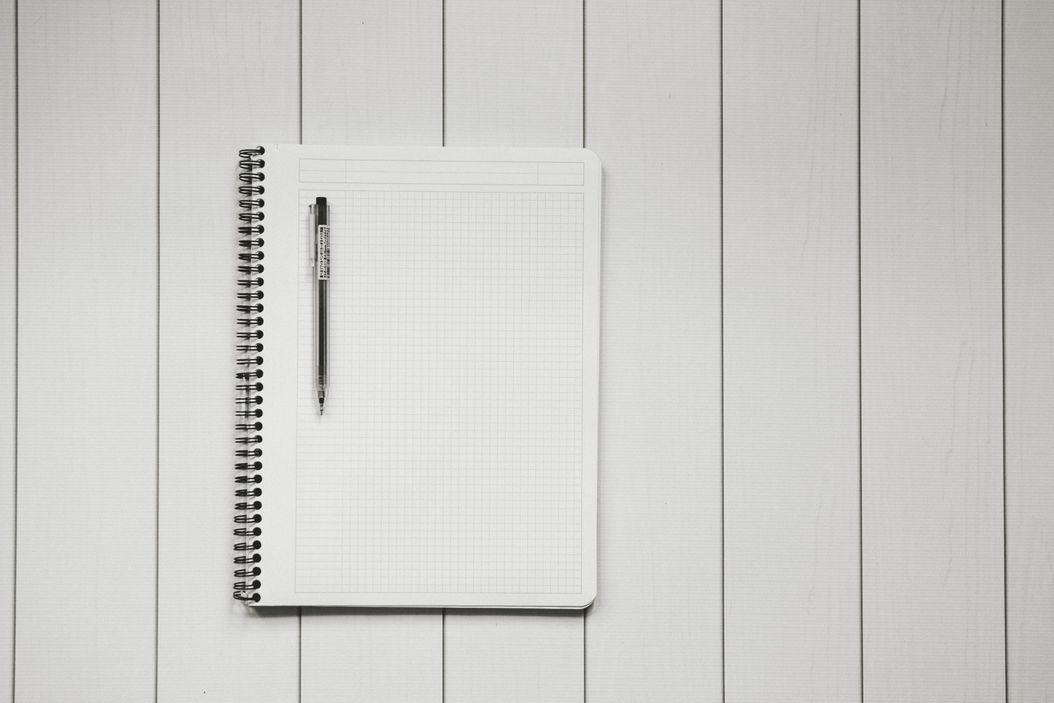Journaling has helped me to identify myself as a writer. Through this practice, I have grown confident in affirming myself as a writer and becoming better at it. I used to be lost in words on a page of who I am but the art of writing has been there for me.
A journal can be like staring at yourself in the mirror for a long time until you get uncomfortable with the reflection. It can feel cathartic and serve as part of meditative practice. It individually serves to deflect back to you where you’ve gone and where you’re going. We take time to check how we look in the mirror, but do we take the time to check with our hearts?
We learn by doing. The habit of daily journaling for me started on April 1, 2019. I was taking a course called Build Your Life Resume (BYLR) taught by Jesse Itzler. He helped me shake up my routine to get out of a rut. The second habit that I intentionally started was journaling every morning. I haven’t stopped since. It started to transform the way that I see myself. The habit shifted from a “want to” and became a “must-do” in my day. There are so many reasons why.
With a place to express your ideas, you’ve created a new best friend. You can tell all of your problems to them. They won’t have the answers to your problems but after writing them down, you’ll be one step closer to solving them then you were before.
Getting thoughts out from your head and onto the page is extremely powerful. It makes it “real”. I may have thoughts that come and go, but ones that I write, are exponentially more significant. The thoughts become real entities. It allows you to be honest with yourself regardless of purpose.It affords the opportunity to visualize what you’ve been thinking and say “does this make sense?” So much of what we are thinking makes sense until it doesn’t.
It allows me to feel cathartic and a sense of relief. Once a feeling is written down I start to accept the feeling. Once an idea is captured, I can let it fly away as a butterfly would since it is stored in my journal. I don’t have to hold it captive in the limited storage of my working memory. Ideas and feelings can be fleeting so writing them down allows you to look back on them.
It helps me with productivity and getting into the best-primed state. Writing is all about rewriting. When you write something down with a pen on paper, it shows intent. If I keep coming back to writing a concept down then I know it is worth doing more digging to solve the answer.
Most importantly, the practice of journaling helps me create a space for reflection. This allows for learning to take place. Learning is a change in a person’s knowledge or behavior from experience. Learning expert Shane Parrish has explained how reflection is a key step in an effective learning loop after an experience takes place.
After internalizing something, the act of externalizing while journaling reinforces what I’ve learned. Educating oneself cannot be done with the belief of transmissionism: that the lecturer says words describing an idea; the class hears the words and maybe scribbles in a notebook; then the class understands the idea. It shows what I still need to learn with gaps in my understanding while reinforcing the lessons that I have learned. With more practice, it allows for long-term learning.
Where to begin?
Determine the purpose. Are you writing this for a better relationship with your emotions? To express your feelings? For performance tracking of your business goals? To be reflective on a trip and capture your experiences with words rather than with a camera? To serve as your learning buddy to track general life thoughts? It can be all of the above in one or in separate places. It’s all up to you. Make your own rules.
Forget the rules. There are so many rules we have to follow in the world. For journaling, make this space your safe haven where it can be as chaotic as you please. If you have been thinking about a question but you don’t know the answer, write it down anyways. It’s not getting evaluated by a teacher, so wreak havoc because your journal should not be perfect… unless you want it to be. Because you make your own rules, feel free to shift them as your life changes.
Start with choosing a medium. If I didn’t have access to my journal I would run through it on my phone or write down some things on a sticky note. I started out digitally on the Day One app but I liked the effect of pen and paper and shows more intent.
Be clear on your audience. I recommend having the purpose be purely for yourself. It allows you to be completely open and vulnerable with yourself without having to think twice about anything that you write down. Anne Frank wrote the first lines in her diary, “I hope I will be able to confide everything to you, as I have never been able to confide in anyone.”
Never miss twice. Okay so to be honest I missed a couple of days journaling last year. But I never missed twice. On those days I missed, I felt at a lack of level-setting and intent for the day. It made me realize how important the practice was to my daily routine and caused me to not miss the next day. If the purpose is to stay on track with external goals, not tracking is means to give up. It indicates that journaling is only something I want to do and the sincerity to change for the habit isn’t present. Knowing the purpose of why I am journaling is critical.
Don’t feel guilty for missing. I would shame myself for falling short of my goal of weekly or monthly reviews. I did an annual review in January and had so many new goals. I’m still perfecting my system to make the most of the process. What makes this such a powerful exercise is that I get to see my thoughts on a page. This allows me to self-actualize and reflect. I realize that life happens. We have to be agile which means letting things take a backseat once in a while for new experiences.
Experiment with different times of the day. Each morning I do a short segment, but most of my journaling is backloaded right before I fall asleep. I know once I externalize what I experienced that day, it was fresh in my memory. I also layout what I want to accomplish the next day. I am very lenient with myself on these intentions because sometimes I wake up the next day and I’m not feeling my best yet. It gives me a compass of where I want to go and achieve. Julia Cameron practices her Morning Pages which is three pages of consciously streamed thoughts onto the page each morning. It serves as the beginning, and this theory is that you can only get better from there.
Have fun buying your journals. I like to write on graph paper. Math was my favorite subject growing up and every day it was the first homework I jumped to doing because I enjoyed writing numbers on graph paper. Be wary of buying a lot of journals. It releases dopamine that causes an early feeling of already being successful at the change you are looking to make. This is why most new year’s resolutions fail. Keep in mind that buying the new running shoes doesn’t magically make us consistent runners. Have your journal be something that you look forward to writing where you can consistently write.
Have a structure. I know some people like to freehand every day. For ten-year-old Jen, I wrote freehand in my first travel journal on a family trip to Key West, Florida. I used to wrack my brain to try to capture all of the experiences I had lived that day. It became a gruesome process that got easier each day as I was doing the same things. I was very precise to put down the times of day the time it was and what cereal I ate. I wrote about the card games I played, the long walks on the beach, and my swims in the pool. I did the same thing nearly every day and I wrote it down anyway. I showed up. That’s the gold for forming a new behavior of any kind.
Since my practice has evolved abundantly. I never wrote about what I was thinking or feeling. I realize at this age I didn’t know what thoughts or feelings were. Nowadays, that is what I actually care about. I wrote about being woken during a sleepover with my cousins to my mother weeping after a phone call that my Dziadzia (polish grandpa) had passed away. I wrote down that he had a “hard attack” and I didn’t even know what it meant to “pass away”. I didn’t write down my questions but I remember being confused.
Fast forward to the beginning of April 2019, I started doing Tim Ferris’s Five Minute Journal practice. With the same prompts each day of what I am grateful for, would make today feel accomplished, and affirmations of who I am. Being that Tim is an expert, I was intimidated to change his prompts. Eventually, I tweaked it to what worked better for me. I started trying different ones to see which was more impactful. I’ve realized that during certain times of my life different prompts are more rewarding than others.
I realized that the prompt of asking myself “what could have gone better” made me filled with regrets that I didn’t take action. I shifted this question each evening to be instead “what did I learn today?” With a more uplifting question to end my day, I felt more fulfilled and accomplished knowing that I learned something rather than had a regret from inaction. Don’t get me wrong, regrets are reminders of the person you want to be, but day after day this reminder left me feeling harsh about myself. There is utility in facing the fire and to turn and face your ghosts. These skills of asking challenging questions will make you become who you want to be much faster, although can be harsh. This is why the individual purpose of journaling is important for each writer to determine.
Journaling can be whatever you make of it. I never regret a page that I write in my journal.



